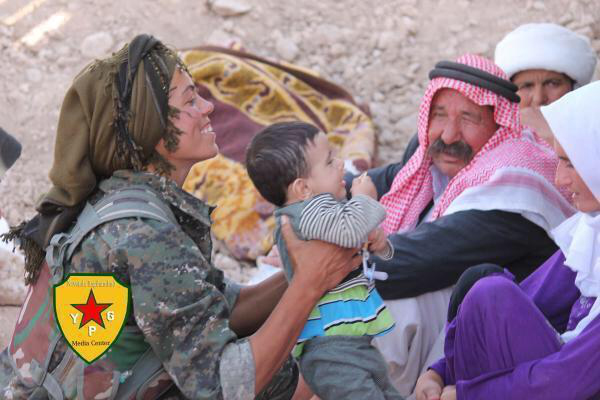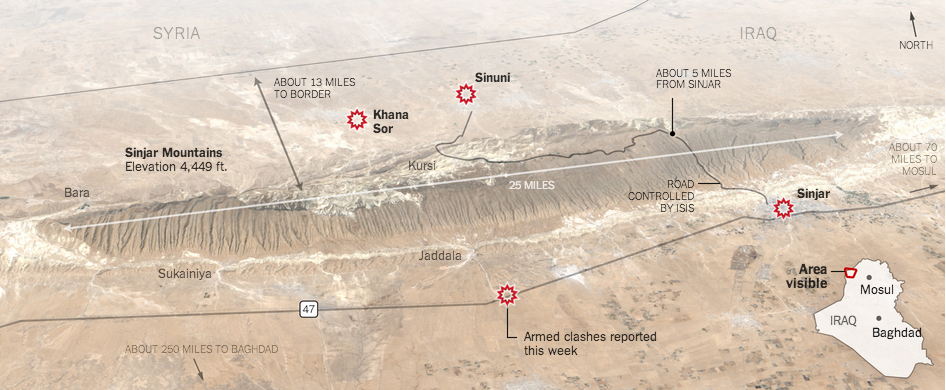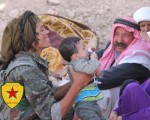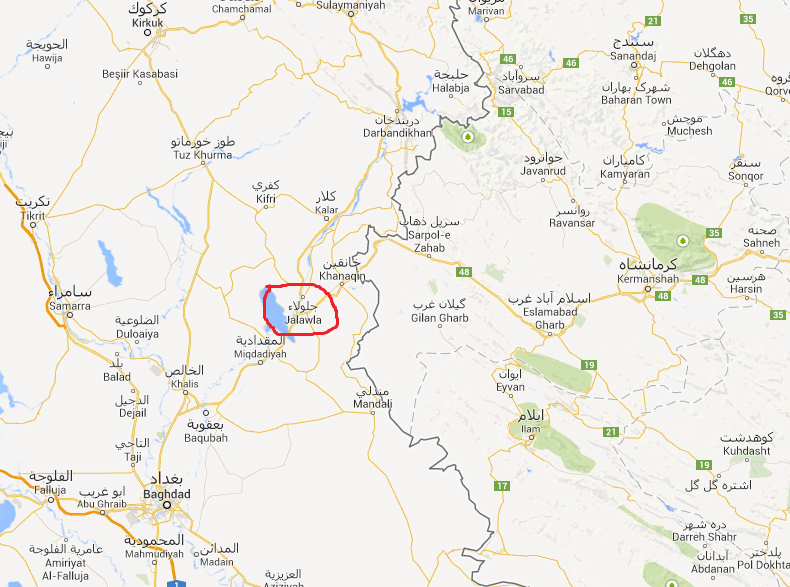The Kurdistan National Congress (KNK) has published a new dossier regarding the ISIS attacks on Kurdistan and retaliations of Kurdish forces and nation against them. Here you can read brief summary of the dossier but for reading the full document, download PDF file here.

Kurdish resistance for humanity and an equal life
Since the start of the war in Syria three years ago (2011), the Islamic State of Iraq and the Levant (ISIS) among other terrorist groups, has become a scourge for our country Kurdistan, the Middle East and indeed rest of the world. This rise has been precipitated by the wrongheaded and short-sighted policies of Turkey, Qatar, Saudi Arabia and some western states. Eschewing a policy of ‘my enemy’s enemy is my ally,’ these states have helped strengthen ISIS, a monster that spreads nothing but savagery and death.
ISIS’s barbaric attacks against the Kurdish people and their gains in Western Kurdistan (Syrian Kurdistan) during the past two years went largely unnoticed until, on 10 June 2014 they captured Mosul (Iraq) and attracted the attention of international public opinion. With newly acquired heavy weaponry, ISIS then focused again on Western Kurdistan with the aim of massacring the Kurdish people in the Kobane Canton, one of the three autonomous states declared in Western Kurdistan a year ago, along with Cizirê and Efrin. However the Kurdish people mobilised en mass and offered unanimous support for the People’s Protection Units, the YPG and YJA (Kurdish military forces for those three cantons), fostering a historic resistance and repelling ISIS from the area. It was after this defeat against Kurdish armed forces that the terrorist group attacked the South of Kurdistan (Iraqi Kurdistan). Since 3 August 2014 ISIS have been attacking one of the Kurdish nation’s most ancient and holy areas, Sinjar (Shengal) and its surroundings; massacring Ezidi Kurds (Yezidis), believers of the most ancient Kurdish religion. Following these attacks more than 50,000 Ezidi Kurds have taken refuge in the Sinjar mountains. More than 300,000 women, children and elderly people have been displaced. Thousands of women, their numbers still not clear, have been abducted and sold into slavery or have been victims of rape. The people in the Sinjar mountains are now confronting starvation and thirst. Almost 300 children have died from malnutrition and dehydration and this number continues to rise each day. According to reports hundreds of women have committed suicide in order not to fall into the hands of ISIS.
With their barbaric attacks against the peoples, religions and communities of Kurdistan and the Middle East, ISIS terrorists have committed crimes against humanity and have brought death and destruction to every household in the region. Beheadings, forced migration, the seizure of property and land, sexual attacks against women, mutilation of girls and the abandonment of children to starvation and death are ongoing in Kobane, Mosul, Sinjar and the UN governed Makhmur (Maxmur) refugee camp as well as other areas of Kurdistan. Everything and everyone that is of historical value, including centres of religion, heritage and art, are targets for ISIS.
Kurdish defence forces are protecting the peoples of the region
The US and EU states are now finally acknowledging the humanitarian crisis and has offered aid. It is evident that this will not absolve them from the role they have played in strengthening ISIS. The well-tested imperialist policy of divide and rule has done nothing but engender ethnic and religious conflict among the diverse peoples of this ancient region.
The Kurdish, Arab, Armenian, Turkmen and Assyrian peoples of the region have formed a common defence force against these policies and attacks. Kurds and the other oppressed communities and belief groups are using their own means and forces to resist the attacks against human values and decency. Faced with the heavy artillery and technical superiority possessed by ISIS, Kurdish defence forces are defending themselves with limited weaponry and military equipment. Male and female guerrillas who are engaged in this legitimate defence in West and South Kurdistan are not just struggling for Kurdish women and Kurds, nor just for the women and peoples of the Middle East, but for women and people who are struggling for progress, freedom and democracy all around the world. In effect they are engaged in an existential struggle for human honour and decency.
Unfortunately we cannot speak of an international counter struggle against ISIS and similar terrorist organisations until the powers supporting them are exposed and sanctions imposed against them by international states and powers. The states in question – Qatar, Saudi Arabia and Turkey – must be brought to account and political and economic sanctions put into effect until they sever all ties with ISIS.
The foremost responsibility of all international organisations and in particular the Western powers should be to support the resistance of the peoples under attack and the Kurdish defence forces resisting ISIS terrorists. This is a historical resistance for democracy and humanity.
Military background to ISIS attacks on Şengal
In the last two months, since the fall of Mosul on 10 June 2014 to the extremist forces of the Islamic State of Iraq and Syria (ISIS), the situation in the Kurdish regions of Syria and Iraq has deteriorated rapidly.
The Syrian conflict provides the background to the current attacks by ISIS against Şengal (Arabic: Sinjar), Rabia, Makhmur and Hewler (Arabic: Erbil). Since mid-2013, ISIS have been in engaged in an armed conflict against Kurds in the three autonomous Kurdish regions of northern Syria. This has become a separate and distinct sub-conflict in the larger armed conflict in Syria.
For over a year, heavy clashes have recurred at multiple frontlines across the three Kurdish regions of Efrin, Kobane (Arabic: Ayn Al-Arab) and Cizirê (Arabic: Al-Jizirah), between the Kurdish armed forces, the People’s Defense Units (YPG), and ISIS.
After the fall of Mosul to ISIS on 10 June 2014, the extremist group was able to reinforce its attacks on the Kurdish regions of Syria, by transferring heavy artillery, tanks and advanced weaponry from Mosul to their bases in Jarablus, Tal Abyad and Raqqah in Syria. From these three locations, the heavy weaponry was used in a major military offensive against the Kurdish region of Kobane, between June and late July 2014.
Facing an existential threat from the attacks by ISIS, the people of Kobane mobilized en masse to protect themselves and their autonomous administration. The YPG was ultimately successful in repelling ISIS’ attacks from all three fronts, after a heroic month-long resistance. As their military plans failed in Kobane, ISIS opened a new front in Cizirê, initiating an offensive on Hasakah city and its surroundings, which are in close proximity to the Syrian-Iraqi border. After days of fierce urban clashes with the YPG units, the ISIS offensive was forced back and eventually halted. The city is now entirely under YPG control.

Attacks in south Kurdistan (Iraq)
On 3 August 2014, ISIS-armed men attacked the ancestral homeland of the ancient Ezidi community, located less than 50km from the Syrian-Iraqi border, west of Mosul in the district of Şengal (Sinjar). ISIS controlled the district, including Şengal town, within 24 hours as Kurdish Peshmerga forces withdrew from their positions. ISIS fighters did not make any distinction between civilians and combatants in the Şengal region. When there were no Kurdish Peshmerga forces left, they launched systematic and indiscriminate attacks on the civilian population. The exact numbers of dead, wounded, hostages and disappeared persons are still unknown, however, local reports speak of 1500-2000 dead civilians as a result of summary executions, killings and starvation or dehydration.
As the Kurdish defense line fell in Şengal, the Ezidi community was subjected to brutal, systematic and unrestrained attacks by ISIS. Militarily, ISIS commanders regrouped their forces and heavy artillery for offensive on the border-town of Rabia. The genocidal attacks on the Ezidi Kurds in conjunction with ISIS attacks on Rabia and the withdrawal of the Peshmerga forces, urged armed units from YPG to intervene immediately from western Kurdistan (Syria) to protect fleeing civilians and open humanitarian corridors for the stranded people in Mount Şengal. This critical intervention by the YPG in the early hours of the conflict saved thousands of lives and prevented ISIS from controlling more territory in rural areas west of Şengal, including the strategic border-town of Rabia.
 Sources: United Nations Office for the Coordination of Humanitarian Affairs; U.S. Department of Defense; American and Kurdish officials
Sources: United Nations Office for the Coordination of Humanitarian Affairs; U.S. Department of Defense; American and Kurdish officials
Meanwhile, the military commander of the Union of Communities of Kurdistan (KCK), Murat Karayilan, declared in a video statement on 4 August 2014 that the People’s Defense Forces (HPG) would also intervene to protect the Ezidi Kurds and fight along other Kurdish forces, including the YPG and the Peshmerga, against ISIS.
The following day, 5 August 2014, ISIS elements initiated an attack in the district of Makhmur with the objective of capturing Makhmur town and the Makhmur refugee camp, with a population of 13,000 Kurds from northern Kurdistan (Turkey). The refugee camp has been under the official protection of the UN since 1998. The camp management had evacuated women and children in the camp on 4 August 2014, as a part of preemptive security measures. Heavy clashes followed in the Makhmur region between Kurdish fighters from HPG, YPG and Peshmerga forces against ISIS. Fierce fighting and shelling have also been reported around Makhmur refugee camp since then. The joint Kurdish forces have been able to repel ISIS attacks and are now in full control of the town.

New attacks by ISIS in Jalaula (Celewla) on Iranian Kurdistan border
On 11 August 2014, reports confirmed that ISIS elements had captured the town of Jalaula, less than 40km from the Iraqi-Iranian border. Heavy clashes continue in the vicinity of Jalaula between Peshmerga forces and ISIS. On 10 August 2014 there were three major suicide attacks by ISIS against Peshmerga positions, killings tens of people. The offensive of ISIS in Jalaula in northeast Iraq marks a new dynamic in this region of Iraq, which pose an imminent security threat to the Kurdish cities of Kirkuk, Khaneqin and Halabja.
Moreover, it poses a wider regional risk for a potential spillover of the conflict into Iran. Iranian military forces have reinforced their presence along the border to prevent eventual cooperation between ISIS and Sunni Arabs living in Iran. An attack by ISIS on the oil-rich city of Kirkuk might trigger a new stream of refugees and result in new mass killings. ISIS will seek to increase its control over energy resources and economic infrastructure in order to strengthen its regional power and establish its own semi-state structure. On the other hand the Kurdish forces of HPG and Peshmerga have declared a state of emergency and formed a joint defense coordination to protect the Kirkuk region, which is inhabited by Kurds, Turkmens, Arabs, Christians and Shiites are living together. Protecting Kirkuk will be central to future efforts for the peace and security of the larger region.
Religious and ethnic minorities in Kurdistan under threat
The rich ethnic and religious fabric of Kurdistan has been formed over thousands years of co-existence between different peoples. This equal co-existence is now under great threat. Despite their differences, these groups share cultural, social, political, economic and psychological similarities, and view their differences as richness. Without external interferences they have generally lived in peace. However at the beginning of the 20th century the nation-state project (Sykes Picot, 1916) was plunged in like a dagger into the heart of the Middle East. This policy of creating homogenous nations sowed hatred and enmity between peoples, resulting in Kurds, Armenians, Assyrians, Turkmens, Keldanis and other peoples facing physical and cultural genocide. It is now evident that imagined borders and political projects that are imposed from outside do not meet the needs of the people and are not successful. These imperialist policies have entrenched war in the Middle East and the victims are once again the people and religious groups.
The Kurdish Freedom Movement believes in the enduring culture of co-existence in the region and has developed a joint life project which is inclusive rather than divisive. This project has been put into practice in Western Kurdistan (Northern Syria) where democratic autonomy has been declared as a model and the different ethnicities, peoples and religious groups are sharing power and the region in peace. Attempts have been made since the beginning to suffocate this revolution, with ISIS standing at the forefront of these attacks. Therefore ISIS and the powers supporting them are the joint enemy of the peoples of the region. Historically, colonialism and nationalism have been used to divide, weaken and rule the people here. Now, it is the mask of Islam that is being used to attack the region.
Ethnic and religious most affected by ISIS attacks and the war in the region are: Ezidi (Yezidi), Assyrian and Chaldean Christian, Turkmen, Shiite and Alawite, Shabak Kurds and Kakai.
Information by: Kurdistan National Congress


